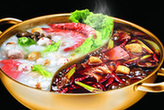A loud, half-muffled laugh squeezing out of his lips, the Chinese man stutters: “Loo-loo-look!” His voice is as rough as the sidewalk chalk a forceful and playful kid drags on the pavement. I frantically scan the street market of Wangfujing—where vendors’ tables align the left and right sides of a narrow pathway that stretches as far as my eyes can see—to find his whereabouts. Suddenly I spot someone in the corner of my eye, pointing. The Chinese vendor’s right arm aims directly at my friend John. The vendor uncovers his mouth using his left hand, as if he is about to blow a kiss. After a brief pause to catch his breath, he finally ejaculates: “Happy Buddha!”
Laughter crackles around us like Chinese fireworks in the early morning under the October sky of Beijing. The amused crowd transforms into a blur when I turn my head; I face the opposite direction again and glance at John, who wears a Chinese revolutionary t-shirt featuring the renowned and heroic Lei Feng. “Welcome to Wangfujing,” he smiles, basking in the attention when sensitive individuals would have interpreted the same event in a negative light. This is his second year in China, so whether or not his sensitivity to such reactions from shocked Chinese dulled long ago or never existed in the first place remains a mystery. Bald and big, he stands out in this ocean of Asian faces. He resembles Stone Cold Steve Austin, the famous professional wrestler—only John’s fatter, by the way. Much fatter. The sun looms above and casts shadows on the dirty concrete. I observe John’s shadow, which resembles a silhouette of Maitreya, the foretold Buddha, the one promised to bring happiness and prosperity to the world.
Americans are familiar with Maitreya’s image: it is the fat, gold Buddha commonly depicted in American-Chinese restaurants. Americans often mistake Maitreya’s image as a depiction of the founder of Buddhism, Siddhartha Gautama. According to John, Maitreya’s fat represents prosperity for the image’s original creators, but for me, it simply represents diabetes, heart disease, sleep apnea, and other health problems. I ponder if the image was created in a culture of food scarcity, because such environmental conditions could make fatness a desirable trait, even a symbol for happiness and prosperity. “Now I want something—some type of jewelry—with the Happy Buddha on it,” John coos, interrupting my thoughts as he eyeballs the Buddhist jewelry nearby. We begin our search.
The laughter drifts away. Wind-ruffled traditional Chinese red lanterns tremble overhead. A gentle, cold breeze drifts in, reminding me of how I used my water bottles as heaters during the cold night: I poured sink water in my kettle, waited a minute or two for the water to boil, transferred the hot water into a bottle, tightened the cap, and placed it under my bed sheets. A fleece blanket and quilt from Wal-Mart proved much more efficient, though. People stir into the streets wearing a variety of warm-looking clothes, such as thick overcoats, wooly hats, and gloves. In front of me a curvaceous Chinese woman, in tan high heels that clack loudly, stumbles more than once while carrying two shopping bags—one with each hand. I hold my breath, praying she doesn’t twist an ankle or tip over; she’s unbreakable as she rocks back and forth like bamboo swaying in the wind. Her bob hair bouncing up and down with each step, she vanishes in the crowds.




Why not rent a boyfriend, or girlfriend to please parents during the Spring Festival?